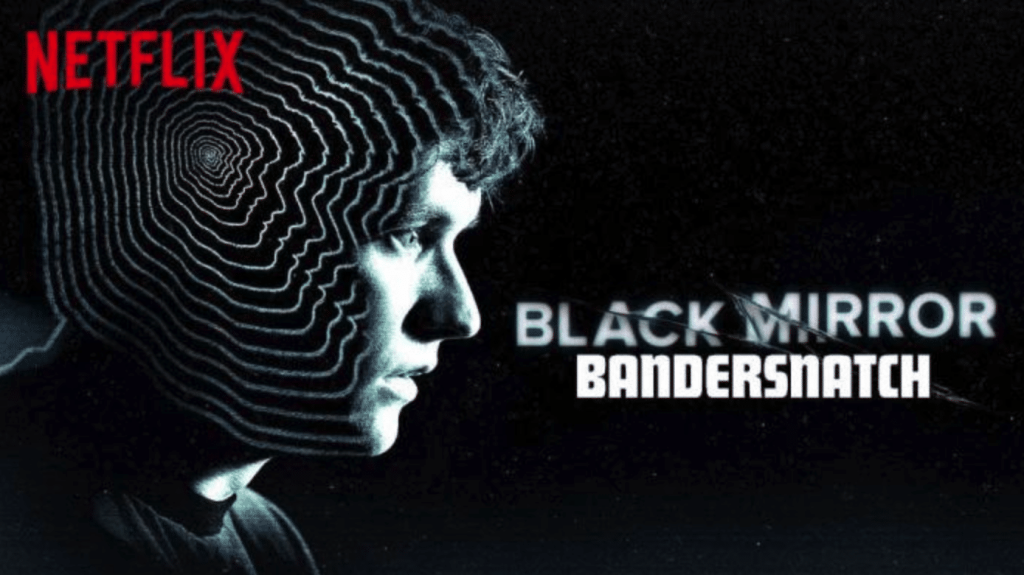[vc_row][vc_column][vc_single_image image=”12451″ img_size=”800×450″ alignment=”center”][vc_column_text]Christmas arrived just a few days late for Black Mirror fans, with the December 28th release of Bandersnatch, that latest episode in the dystopian anthology Netflix series. With the trailer dropping just one day prior to its arrival, the new stand-alone film weaves an interactive choose-your-own-adventure storyline with a sinister sci-fi and 80’s backdrop. Netflix has been grappling with new ways to revolutionize storytelling, with rumors circulating for quite some time about their forthcoming experiment with allowing audience members to control their own viewing experience.
Are Frosties fans more likely to off their father or hightail it away from possible prison scenarios? While Netflix analyzes their users’ choices, viewers are thrust into a world that questions alternate realities, predetermined destinies vs. free will, and the impact of seemingly benign decisions, like should we grace our ears with Now 2 or Thompson Twins.
Before the story begins, you’ll enjoy a short tutorial, much like the in-flight safety videos that interrupt your movie after takeoff, with instructions on how to play. From there, the story follows Stefan Butler, a young video game developer, played by Dunkirk’s Fionn Whitehead. Inspired by a CYOA novel named Bandersnatch, Stefan designs a video game of the same name, which he successfully pitches to a London gaming company named Tuckersoft.
Mohan Tucker (Asim Chaudhry), head of Tuckersoft, gives Stefan a very short leash to produce the game, propelling Stefan into an unhealthy lifestyle. Between the isolation, lengthy stretches of time coding the program, and lack of food or sleep, he slowly begins to lose his grip on reality. He shrugs off his mental and physical exhaustion, completely fixated on meeting his deadline.
Childhood trauma over the untimely death of his mother paired with a rapidly declining mental state and the disturbingly dark past of Bandersnatch’s author, Jerome F. Davies, sends Stefan spiraling. He becomes consumed by the idea that he is being manipulated and controlled by someone.
His obsession and delusions are further fueled by one of his heroes and fellow game developer, Colin (Will Poulter). Through an impassioned, drug-induced rant about layered realities and multiple timelines that would make Donnie Darko proud, Colin convinces Stefan that life is one big game, using Pac-Man as a metaphor for manipulation and control.
As Colin puts it, “[Pac-Man] thinks he has free will but he’s really trapped in a maze. It’s not a happy game. It’s a fucking nightmare world, and it’s real, and we’re living in it.” In an effort to prove his own argument and nihilistic view of our own choices, Colin leaps from his balcony and dies. Or does he? Maybe Stefan is the one sent hurtling to his death. Ultimately, the choice is yours.
The entire experience feels like a Rorschach test, pushing viewers to question each choice they make. The series of double-backs and restarts automatically prompted by the show helped ease the FOMO I had when selecting one option over another. However, it felt redundant over time and lent itself to a very staccato narrative. If there’s one thing I can’t deny, though, it’s Charlie Brooker’s creative vision as he explores the world of immersive entertainment. It’s certainly a mind-bending experience that requires you to adjust your traditional sit-back-and-watch expectations.
Did I feel the itch of Goosebumps nostalgia? Yes. Did I feel helpless trying to help Stefan succeed? Also yes.
But no, Black Mirror doesn’t stop there. They’re really fixated on screwing with us, basically turning our television screen into a mirror designed to reflect back the ugliness of humanity. It’s not about Stefan. It’s about us, our need to consume, and a potential future darkened and distorted by technological advancements. The more viewers watched Stefan plunge into hell, the more addictive the game became.
To really nail the point home and laugh in our faces, Netflix went ahead and did this:

Source: Netflix
Oh yes, that’s Netflix’s brilliant tongue-in-cheek way of not only inserting themselves into the storyline, but implicating their viewers in the process. That’s right, they are shamelessly exploiting the gluttonous, and often apathetic, way we consume entertainment. Not convinced? Just take a second look at the option sitting next to Netflix in the photo above. That symbol also appeared in season two during the episode White Bear, in which spectators found entertainment in the torture and humiliation of others via an amusement park.
Did you make Stefan jump? Were you elated by the prospect of making him take acid? Did you smile as you selected ‘Fuck yeah!” to the action scene? So, what did you do? [/vc_column_text][/vc_column][/vc_row]

Either typing away on my keyboard or nose-deep in a good book. Say hi to me on Twitter @Kkantro.










